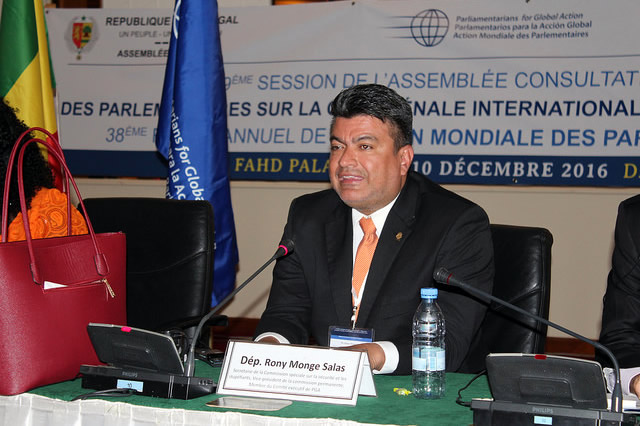
On 6 December 2016, Dip. Ronny Monge, PGA Board Member, tabled bill n°4573 which amends the Criminal Code of Costa Rica in order to implement the crimes included in the Rome Statute as well as the Kampala Amendments.
The introduction of such draft legislation represents the materialization of Costa Rica’s commitment to fight against impunity for international crimes and strengthen the domestic Rule of Law through the complete implementation of the Rome Statute of the International Criminal Court (ICC).
Indeed, on 4 November 2016, Dip. Antonio Alvarez Desanti, President of the Legislative Assembly of Costa Rica had informed PGA about the fact that he would consult his office in order to include bill n°4573 on the implementation of the crimes under the Rome Statute in the Agenda of the Plenary. President Desanti is conscious of the necessity of the Rome Statute system as a tool to prevent and prosecute atrocities that are still ongoing in the world and reiterated his country’s commitment to the promotion of international justice, including within the Latin America region.
Costa Rica has been playing a key role in promoting the universality of the Rome Statute in the world and, in particular, within the Latin America region. Dip. Ronny Monge rightly reminded the participants of the Sub-Regional Parliamentary Seminar on the ICC: Legislators from Latin America commit to the principle of Never again and Reparation for Victims of the fact that Costa Rica may be a peaceful country but, as long as there are atrocity crimes being committed elsewhere on Earth, each State is responsible to fight against the impunity of the authors of such crimes. As a result, it is essential that all States fully implement the Rome Statute in their domestic legal order, in compliance with the principle of complementarity, fundamental pillar of said Statute, and implement mechanisms of cooperation with the ICC.
The country had previously made a notable contribution to the promotion of universality in the region by hosting on 10 July 2015, in collaboration with PGA and the ICC, a Special Session on the Ratification and Implementation of the Rome Statute, under the leadership of Dip. Ronny Monge Salas. During the session, Parliamentarians from Costa Rica and El Salvador had the opportunity to exchange on the different aspects of the implementation of the Rome Statute in their respective domestic legal orders. Among the speakers, Judge Silvia Fernandez de Gurmendi, president of the ICC, addressed the distinguished legislators among which the representatives of 4 political parties from El Salvador, to tackle all the misrepresentations that they may have had on the Rome Statute system. It is to be said that these efforts culminated in the parliamentary vote of 26 November 2015, in favor of the accession of El Salvador, converting the country into the 124th States Party to the Rome Statute and 1st State Party to have ratified the revised version of the Statute that include the Kampala Amendments.



